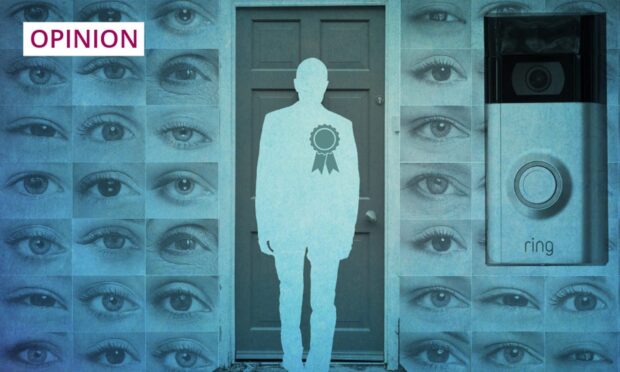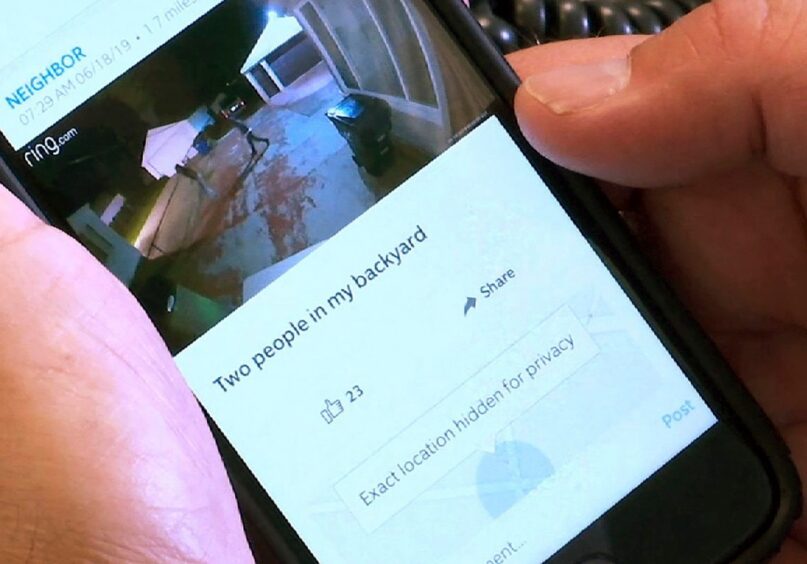There has been no hiding from the all-seeing eye of the Ring doorbell camera in this election.
Those hitting the pavement in search of support now no longer contend with simple fears like bad weather and unfriendly dogs.
A new, high-tech threat has emerged. The era of Ring doorbell campaigning, and it will change how we do politics.
One minute, campaigners and Westminster hopefuls are attempting to woo voters on the doorstep.
The next, they are at the centre of ding-dong-drama. Enticing, spy-cam like footage capturing their gaffe in excruciating detail, whipping up a storm on social media.
Doorstep drama
At best merely embarrassing, at worst career ending, clips can be shared instantly and give an unvarnished look at the reality of doorstep campaigning.
Devoured by the opposition and the press, this modern day development on the age old tale of political PR disasters has become a prominent feature of the General Election campaign.
In Aberdeen, Labour’s candidate was left embarrassed after footage was released showing him tell a voter his party “did not bother” to campaign in 2019 in the hope the Tories would win over the SNP.
In England, two Conservative campaigners were recorded commenting on the number of immigrants living on one street compared to another.
“They don’t reveal anything,” the activists were heard saying.
Another candid camera captured a Liberal Democrat candidate joked with a Liverpudlian woman about “nicking stuff” from the house she was minding.
With high-definition cameras and powerful microphones, the devices, which can be purchased and installed for less than £50, are able to capture incredible detail.
Candid cameras capture more than crime
They are an increasingly familiar sight around our streets, and have even helped to fight crime and identify home invaders.
Across Tayside and Fife, campaigners tell me they are now very aware they could be being recorded during every conservation.
One, who asked to remain anonymous, said: “It’s so easy to miss them, so I can see why people have been caught out.
“Even the most polished politician isn’t ‘on’ all the time and voters expect to meet the real deal when you arrive on their doorstep. They don’t expect to simply hear the polished lines.
“It does make me think twice about what I say now, and if I’m trying to convince someone I’ll always be thinking about how it will sound on social media.”
Kayleigh Quinn, associate director at public affairs firm Cavendish and a former Labour organiser, also shared her concerns about the potential downside.
She told me: “It’s important to remember that most people knocking your door in this election are volunteers giving up their time because they want better for their community and society.
“The worry is, that much like X, these doorbells could be pushing people away from becoming involved in politics.
Repercussions
“The most common worry for new volunteers is that they’ll be asked a difficult policy question and they don’t want to let anyone down by fluffing the answer because they’re not a politician – and now there’s the worry that they could go viral.”
“It isn’t something for most experienced activists to worry about, but we have to make sure we don’t put normal people off joining in with their local campaign – politics needs more of them.”
As a journalist, I’ll welcome any opportunity to report on more political gaffes. The more embarrassing details, whichever party is involved, the better.
But as a citizen, I worry about the threat to the tradition of door-to-door campaigning. Where voters can meet those seeking their vote and put their concerns to them directly.
It is a way of doing politics that has served us well, and it is politics its most honest form, candidate to voter. Promises and pledges are harder to break when they’ve been made eye-to-eye.
This risks something more than the red-faces of a gaffe.












Conversation